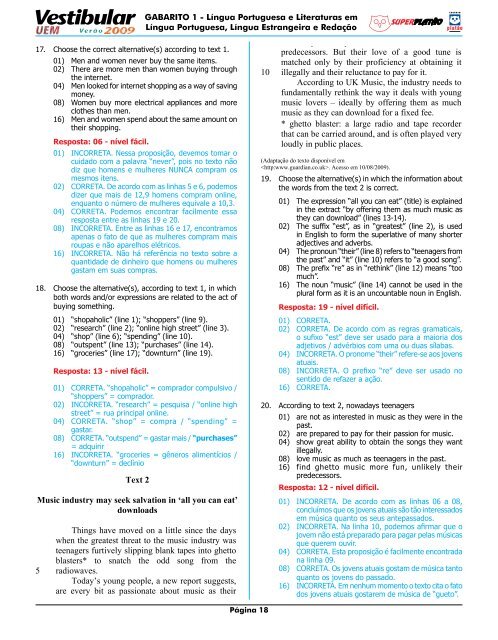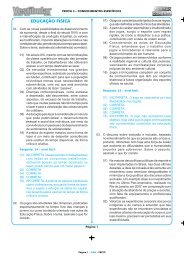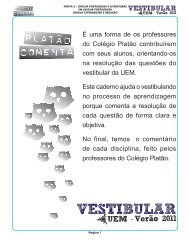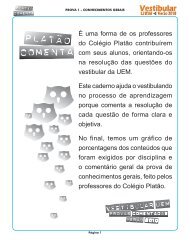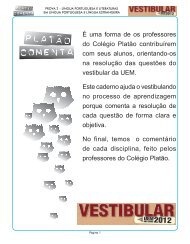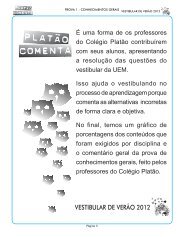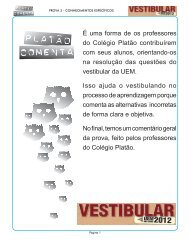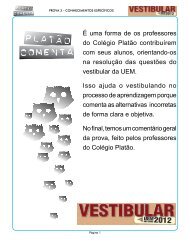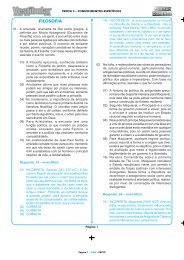Língua Portuguesa e Literaturas em Língua ... - Colégio Platão
Língua Portuguesa e Literaturas em Língua ... - Colégio Platão
Língua Portuguesa e Literaturas em Língua ... - Colégio Platão
Create successful ePaper yourself
Turn your PDF publications into a flip-book with our unique Google optimized e-Paper software.
GABARITO 1 - <strong>Língua</strong> <strong>Portuguesa</strong> e <strong>Literaturas</strong> <strong>em</strong><br />
<strong>Língua</strong> <strong>Portuguesa</strong>, <strong>Língua</strong> Estrangeira e Redação<br />
17. Choose the correct alternative(s) according to text 1.<br />
01) Men and women never buy the same it<strong>em</strong>s.<br />
02) There are more men than women buying through<br />
the internet.<br />
04) Men looked for internet shopping as a way of saving<br />
money.<br />
08) Women buy more electrical appliances and more<br />
clothes than men.<br />
16) Men and women spend about the same amount on<br />
their shopping.<br />
Resposta: 06 - nível fácil.<br />
01) INCORRETA. Nessa proposição, dev<strong>em</strong>os tomar o<br />
cuidado com a palavra “never”, pois no texto não<br />
diz que homens e mulheres NUNCA compram os<br />
mesmos itens.<br />
02) CORRETA. De acordo com as linhas 5 e 6, pod<strong>em</strong>os<br />
dizer que mais de 12,9 homens compram online,<br />
enquanto o número de mulheres equivale a 10,3.<br />
04) CORRETA. Pod<strong>em</strong>os encontrar facilmente essa<br />
resposta entre as linhas 19 e 20.<br />
08) INCORRETA. Entre as linhas 16 e 17, encontramos<br />
apenas o fato de que as mulheres compram mais<br />
roupas e não aparelhos elétricos.<br />
16) INCORRETA. Não há referência no texto sobre a<br />
quantidade de dinheiro que homens ou mulheres<br />
gastam <strong>em</strong> suas compras.<br />
18. Choose the alternative(s), according to text 1, in which<br />
both words and/or expressions are related to the act of<br />
buying something.<br />
01) “shopaholic” (line 1); “shoppers” (line 9).<br />
02) “research” (line 2); “online high street” (line 3).<br />
04) “shop” (line 6); “spending” (line 10).<br />
08) “outspent” (line 13); “purchases” (line 14).<br />
16) “groceries” (line 17); “downturn” (line 19).<br />
Resposta: 13 - nível fácil.<br />
01) CORRETA. “shopaholic” = comprador compulsivo /<br />
“shoppers” = comprador.<br />
02) INCORRETA. “research” = pesquisa / “online high<br />
street” = rua principal online.<br />
04) CORRETA. “shop” = compra / “spending” =<br />
gastar.<br />
08) CORRETA. “outspend” = gastar mais / “purchases”<br />
= adquirir<br />
16) INCORRETA. “groceries = gêneros alimentícios /<br />
“downturn” = declìnio<br />
19. Choose the alternative(s) in which the information about<br />
the words from the text 2 is correct.<br />
01) The expression “all you can eat” (title) is explained<br />
in the extract “by offering th<strong>em</strong> as much music as<br />
they can download” (lines 13-14).<br />
02) The suffix “est”, as in “greatest” (line 2), is used<br />
in English to form the superlative of many shorter<br />
adjectives and adverbs.<br />
04) The pronoun “their” (line 8) refers to “teenagers from<br />
the past” and “it” (line 10) refers to “a good song”.<br />
08) The prefix “re” as in “rethink” (line 12) means “too<br />
much”.<br />
16) The noun “music” (line 14) cannot be used in the<br />
plural form as it is an uncountable noun in English.<br />
Resposta: 19 - nível difícil.<br />
01) CORRETA.<br />
02) CORRETA. De acordo com as regras gramaticais,<br />
o sufixo “est” deve ser usado para a maioria dos<br />
adjetivos / advérbios com uma ou duas sílabas.<br />
04) INCORRETA. O pronome “their” refere-se aos jovens<br />
atuais.<br />
08) INCORRETA. O prefixo “re” deve ser usado no<br />
sentido de refazer a ação.<br />
16) CORRETA.<br />
20. According to text 2, nowadays teenagers<br />
01) are not as interested in music as they were in the<br />
past.<br />
02) are prepared to pay for their passion for music.<br />
04) show great ability to obtain the songs they want<br />
illegally.<br />
08) love music as much as teenagers in the past.<br />
16) find ghetto music more fun, unlikely their<br />
predecessors.<br />
Resposta: 12 - nível difícil.<br />
01) INCORRETA. De acordo com as linhas 06 a 08,<br />
concluímos que os jovens atuais são tão interessados<br />
<strong>em</strong> música quanto os seus antepassados.<br />
02) INCORRETA. Na linha 10, pod<strong>em</strong>os afirmar que o<br />
jov<strong>em</strong> não está preparado para pagar pelas músicas<br />
que quer<strong>em</strong> ouvir.<br />
04) CORRETA. Esta proposição é facilmente encontrada<br />
na linha 09.<br />
08) CORRETA. Os jovens atuais gostam de música tanto<br />
quanto os jovens do passado.<br />
16) INCORRETA. Em nenhum momento o texto cita o fato<br />
dos jovens atuais gostar<strong>em</strong> de música de “gueto”.<br />
Página 18


